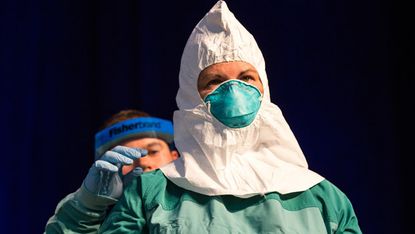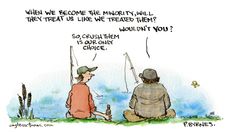Ebola: should doctors be forced to treat infected patients?
The risk of Ebola transmission raises an ethical dilemma as some say medics are duty-bound to provide care

The Ebola outbreak is forcing the global medical community to consider the "previously unthinkable"; withholding emergency treatment from infected patients.
Due to the risk of transmission, some hospitals in the US are currently reviewing their policies on the treatment of patients with the virus, Reuters reports. The risk became apparent after two nurses were infected while caring for a patient in Texas.
This comes as nurses in Canada are told they will face disciplinary action if they refuse to treat a patient with Ebola, according to the Canadian Broadcasting Corporation.
Subscribe to The Week
Escape your echo chamber. Get the facts behind the news, plus analysis from multiple perspectives.

Sign up for The Week's Free Newsletters
From our morning news briefing to a weekly Good News Newsletter, get the best of The Week delivered directly to your inbox.
From our morning news briefing to a weekly Good News Newsletter, get the best of The Week delivered directly to your inbox.
In the UK, even though healthcare workers "may be anxious "about treating patients with Ebola, they are duty-bound to do so, according to the MDU, the country's leading medical defence organisation.
The treatments being discussed in the US debate could be life-saving but are often invasive. They includes CPR, inserting breathing tubes and dialysis. "To have a blanket refusal to offer these procedures is not ethically acceptable," said Dr G Kevin Donovan, director of the bioethics centre at Georgetown University in Washington.
Dr Nancy Kass, a bioethicist at Johns Hopkins Bloomberg School of Public Health, argues that as long as healthcare workers are provided with adequate protection, they should have to treat the patient.
But others say that such measures go beyond a healthcare worker's professional obligations and they should have the right to refuse to offer treatment, as it would put them at risk.
"The idea that a doctor would stick to his post during an epidemic, that's not part of the Hippocratic Oath," says medical historian Dr Howard Markel. "If you feel your life is at risk you don't have to stay and provide care."
Laurence McCullough, a clinical ethicist at Baylor College of Medicine says the issue "reminds us that there are justified limits on the risk to health and life that health care professionals are expected to take in the care of patients".
Rushing into a quarantined hospital room to administer such treatment could cause lapses in safety procedures, some argue, saying it would be both unsafe and impractical. "To provide timely resuscitation, hospitals would need staff workers suited in protective gear around the clock," argues Lawrence Altman in the New York Times.
Regardless of what each healthcare system decides, policies must be put in place beforehand, warns Dr Fins, chief of medical ethics at Weill Cornell Medical College. "Confronting this problem in the heat of a cardiac arrest is not the right time to be thinking about it."
Create an account with the same email registered to your subscription to unlock access.
Sign up for Today's Best Articles in your inbox
A free daily email with the biggest news stories of the day – and the best features from TheWeek.com
-
 Today's political cartoons - May 4, 2024
Today's political cartoons - May 4, 2024Cartoons Saturday's cartoons - reflections in the pond, riding shotgun, and more
By The Week US Published
-
 5 high-caliber cartoons about Kristi Noem shooting her puppy
5 high-caliber cartoons about Kristi Noem shooting her puppyCartoons Artists take on the rainbow bridge, a farm upstate, and more
By The Week US Published
-
 The Week Unwrapped: Why is the world running low on blood?
The Week Unwrapped: Why is the world running low on blood?Podcast Scientists believe universal donor blood is within reach – plus, the row over an immersive D-Day simulation, and an Ozempic faux pas
By The Week Staff Published
-
 Nigeria's worsening rate of maternal mortality
Nigeria's worsening rate of maternal mortalityUnder the radar Economic crisis is making hospitals unaffordable, with women increasingly not receiving the care they need
By Harriet Marsden, The Week UK Published
-
 Dengue hits the Americas hard and early
Dengue hits the Americas hard and earlySpeed Read Puerto Rico has declared an epidemic as dengue cases surge
By Peter Weber, The Week US Published
-
 How happy is Finland really?
How happy is Finland really?Today's Big Question Nordic nation tops global happiness survey for seventh year in a row with 'focus on contentment over joy'
By Harriet Marsden, The Week UK Published
-
 How Tehran became the world's nose job capital
How Tehran became the world's nose job capitalUnder the radar Iranian doctors raise alarm over low costs, weak regulation and online influence of 'Western beauty standards'
By Harriet Marsden, The Week UK Published
-
 Africa's renewed battle against female genital mutilation
Africa's renewed battle against female genital mutilationUnder the radar Campaigners call for ban in Sierra Leone after deaths of three girls as coast-to-coast convoy prepares to depart
By Harriet Marsden, The Week UK Published
-
 Argentina: the therapy capital of the world
Argentina: the therapy capital of the worldUnder the radar Buenos Aires natives go hungry to pay for psychoanalysis, amid growing instability, anxiety – and societal acceptance
By Harriet Marsden, The Week UK Published
-
 Does declining birth rate spell doom for Britain?
Does declining birth rate spell doom for Britain?Today's Big Question Ageing population puts pressure on welfare state, economy and fabric of society, while fertility is rising on populist agendas
By Harriet Marsden, The Week UK Published
-
 How a new blood test could revolutionise sepsis diagnosis
How a new blood test could revolutionise sepsis diagnosisThe Explainer Early results from ongoing trial suggest faster identification of deadly condition is possible
By The Week Staff Published